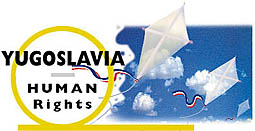
The Federal Republic of Yugoslavia recognizes and guarantees the rights of the members of national minorities to preserve, develop and express their ethnic, cultural, language and other particularities, and to the use of national symbols, in accordance with the international law (art. 11). According to the last census, in 1991, Yugoslavia had a population Serbs and Montenegrins and there are 26 recognized national minorities and they represent one third of the total population. The largest are Albanians, Bulgarians, Croats, Hungarians, Macedonians, Moslems, Romanis, Rumanians, Slovaks, Turks, Wallachians etc . Article 45 of the FRY Constitution, guarantees the freedom of expression of nationality and culture, and the use of one’s own language and alphabet. The FRY supports the preservance of national identity and cultivates the cultural heritage of national minorities and their contact with their country of origin. Government, from their own budget, finances the work of artistic-cultural organizations, theatrical performances, as well as their appearances in their country of origin. There are many national cultural-educational communities, for example Association of Yugoslav Romanies Cultural Achievements, Cultural society of Sandzak’s Muslims "Rebirth", Ruthenian Cultural literary Society, etc. In the regions populated by national minorities, according to the law, their languages and alphabets are in official use (art. 15). Simultaneously with the Serbian language, Hungarian, Slovak, Rumanian and Ruthenian languages are in official use in Vojvodina, and Albanian in Kosovo and Metohija. The members of the national minorities are entitled to education in their own languages (art. 46). The positive regulations of the FRY allow the possibility of organization of the entire teaching in the languages of national minorities, on all levels of education. The law also stipulates the possibility of organization of bilingual teaching or additional teaching of mother tongue, with elements of the national culture. In Vojvodina, the teaching in the primary schools is performed in 5 different languages, and in 4 different languages in the secondary schools. College and university education in Hungarian is organized at 7 faculties while education in Slovak, Rumanian, and Ruthenian is organized at 2 faculties for each of the languages.
The Albanians in Kosovo established a parallel educational system, based on illegal curricula, criteria and textbooks, whose contents are directed against the Republic of Serbia and the Federal Republic of Yugoslavia. The diplomas issued by that system are not recognized - neither in the FRY, nor abroad. The Constitution of the FRY guarantees to the national minorities the right to be informed in their own respective languages (art. 46). In Yugoslavia, there exist over 150 newspapers and magazines published in the languages of the national minorities. The Radio and TV Pristina broadcasts its programs in Serbian, Albanian, Turkish and Romani. The TV Novi Sad broadcasts its regular programs in 5 languages - Serbian, Hungarian, Slovak, Rumanian,Ruthenian. The radio stations in Vojvodina broadcast their programs in 8 languages of the national minorities. Members of national minorities have the right to establish educational and cultural organizations, in conformity with the law, which are financed on the principle of voluntary contributions, and may also receive assistance from the state (Article 47 of The Constitution). Members of national minorities have the right to establish and foster unhindered relations with conationals within the Republic of Yugoslavia and outside its borders with conationals in other states, and to take part in international non-governmental organizations (Article 48) |

 The members of the Albanian national minority
boycott the legal system of education which is offered in Albanian. That boycott is the
expression of the secessionist policy based on the ethnic criterion, directed to the
non-recognition of the legal state bodies and institutions of the Republic of Serbia, and
on the endeavors to make that part of Serbia independent and to establish the so called
Republic of Kosovo. Such endeavors of the members of the Albanian national minority are
against the Constitution and directly opposed to International Law standards concerning
the status of national minorities. Before the boycott, there existed 904 Albanian primary
schools, 69 secondary schools and the University in Pristina, with 37.000 students, out of
whom 80% were Albanians who studied in Albanian.
The members of the Albanian national minority
boycott the legal system of education which is offered in Albanian. That boycott is the
expression of the secessionist policy based on the ethnic criterion, directed to the
non-recognition of the legal state bodies and institutions of the Republic of Serbia, and
on the endeavors to make that part of Serbia independent and to establish the so called
Republic of Kosovo. Such endeavors of the members of the Albanian national minority are
against the Constitution and directly opposed to International Law standards concerning
the status of national minorities. Before the boycott, there existed 904 Albanian primary
schools, 69 secondary schools and the University in Pristina, with 37.000 students, out of
whom 80% were Albanians who studied in Albanian.